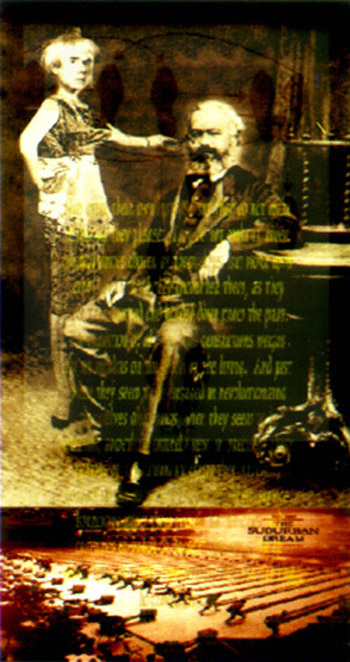
Karl Marx Shaved by Andy Warhol, of The Suburban Dream of Borrowed History, by Matthew Friday

Matthew Friday SUNY Oswego, Department of Art, Tyler Hall, Oswego NY 13126 [email protected] www.socrepsoc.com
"The mode of production in material life determines the general character of the social, political, and spiritual processes of life. It is not the consciousness of men that determines their existence, but on the contrary, it is their social existence which determines consciousness."- Karl Marx
Artist's Statement: My current work deals with the collapse of meta-narratives inherent in lived relations of postmodernity. Loosely based on the writings of Jacques Derrida and Jean Francois Lyotard, this work can be said to reflect the ironic and often contradictory nature of contemporary life. As an artist who grew up and became self-conscious in the techno-capitalist information age, my early indoctrination was that of cartoons, rock videos, and the glorious apocalyptic visions of the cold war, promised to my generation by the media. For members of my generation the apotheosis of nuclear war was not only a plausible reality, but also a desired one. The vainglorious belief in the total disruption of nuclear war, seemed the only hope of returning civilization to a utopian pre-modern ideal. One has only to observe the mass media during this period, as it reflects its saturation with end of the century apocalyptic stories; Blade Runner, The Mad Max series, Threads, The Day After, The Day of the Comet, Return of the Living Dead I and II, Defcon 4, and my favorite Red Dawn. Within this cultural paradigm, the only sincere emotion members of my generation seem to be capable of are apathy, cynicism, and nostalgia. All of which are a means of accepting and existing in a state where there are no longer any plausible meta-narratives, beyond that of economic reality, to define the tangible barriers necessary to create a socially accepted reality concept. As a member of this culture, whose consciousness is a direct result of participation in society, my art can be defined within the context of these predominant feelings of apathy, cynicism and nostalgia. Within the flexible variables of the contemporary mediascape, the only form of solace plausible is that of nostalgia for a reality that never was. Nostalgia that takes the form of an ever present longing for a glorified utopian ideal, or a simpler way of life. Since my perceptual basis does not allow for the possibility of transcendence, this ideal exists as a entirely fictional belief and usually manifests as a longing for a particular discontinued television series (Gilligan's Island) or mythic representations of the cold-war socialism. This lack of fixed identity, meaning, and narrative creates a convoluted matrix, in which any coherent ideal must transient, fictional, culture bound and ultimately dysfunctional. The writings of Jacques Derrida and Jean Francois Lyotard manifest a ferocious critique against any over-arching system of thought. As we move into the twenty-first century it seems as if the dominant structural narrative is that rampant technology at the service of global capitalism. As Derrida and Lyotard point out, the basis of a positivistic attitude towards scientific progress is to be found in the Cartesian rationalism, which although it lies at the heart of Western Society, often remains unquestioned. It is my hope that my work communicates this uncertainty in a manner that is both absurd and disturbing.